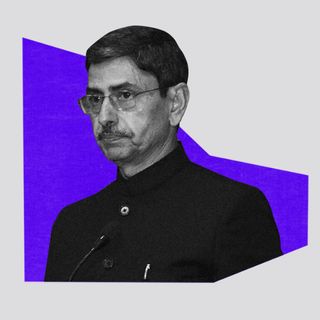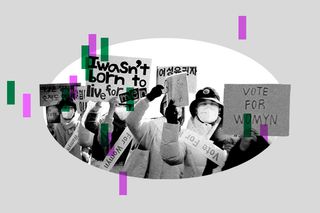
Feminists in South Korea Are Protesting a Wave of Anti‑Feminism
The current movement was catalyzed by the suicides of K-pop stars in 2019, and a subsequent rise in misogyny in the country’s national discourse.

A feminist churn is underway in South Korea. This week, news of massive nationwide feminist protests in the country sparked conversations about the its low performance across various gender equality metrics in the developed world. The protests come at a time when the atmosphere in the country became so hostile toward feminism, that even speaking about it publicly could attract scorn and abuse. And it matters because South Korea is one of the few countries in the world where a leader rose to power specifically on a rising anti-feminist sentiment.
When the #MeToo movement began in South Korea 2018, it was simultaneously one of Asia’s most successful feminist moments, and it brought down several prominent public figures, including the mayor of Busan. But it also triggered the largest wave of anti-MeToo protesters (with men gathering to chant “Me First”). All of this culminated in the first wave of feminist protests after the pandemic, where thousands of women are gathering to resist a pervasive climate of misogyny — culturally and politically.
But here’s also why it matters for the rest of the world: its cultural exports have a lot to do with growing feminist frustration too. Restrictive beauty norms led to the “escape the corset” movement in 2019, which protested South Korea’s intense fixation on beauty for women. The plastic surgery and K-beauty industry (that popularized 10 to 18-step skincare routines) are some of its most popular and successful exports to the world — but they remain a patriarchal instrument of control within South Korea. Straying from beauty norms comes with high penalties. So much so, that an Olympic archer faced relentless online abuse for her hairstyle that made her “look like a radical feminist.”
Then, there’s also the K-pop industry, and how it represents the intersection of capitalism and patriarchy, by imposing a grueling code of behavior on its stars. Those who don’t conform to a carefully curated image — famously, the star Sulli, who rejectedwearing bras and addressed older men by their first names — suffer an outpouring of misogyny and hate. Take the fact that a new wave of feminist conversations saw a resurgence with the deaths of two K-pop stars in 2019. Sulli and Goo Hara, two of South Korea’s most famous stars at the time, died by suicide in what fans eventually began to call “social murders” for how they were purportedly triggered by misogynistic cyberbullying. Actor Oh In-hye followed in 2020, and actor-model Song Yoo-jung, in 2021.
Related on The Swaddle:
What Makes Women‑Led Protests Different From Others?
The deaths of these young female performers in South Korea spotlighted gender inequality in the country. It prompted young feminists to take up the mantle of feminist advocacy — petitioning for harsher laws against sexual harassment, and an end to cyberbullying, among others. But this rising tide of feminist discourse, too, was quickly followed by a strong anti-feminist backlash. Men began to claim that they were being discriminated against, and their rights were under attack. Soon, they began to populate the cultural sphere with strong anti-feminist rhetoric.
“As a feminist, to reveal your face and speak out has such unimaginable consequences,” YouTuber Ji-eun told BBC. Anti-feminist YouTubers with hundreds of thousands of followers have begun to popularize the notion that feminists are “mentally ill.” Hwang, of Haeil, a feminist organization, told NPR that “femi” became a derogatory word for feminist, such that it’s akin to calling someone mentally ill.
Eventually, even President Yoon Suk Yeol is said to have capitalized on the anti-feminist backlash, making the atmosphere all the more hostile for feminists in South Korea. Yeol promised male voters that he would abolish the Ministry for Gender Equality and Family, and promised harsh punishments for “false” rape cases — both moves that deter women from reporting sexual assault and would direct budgetary resources away from equality initiatives.
A nexus of globalization, patriarchy, and capitalism, then, have led to a virulently anti-feminist atmosphere in South Korea today — and it’s a trajectory that forces the rest of the world to pay attention. K-pop and K-beauty remain industries that the rest of the world supports culturally and financially. They give the South Korean state soft power, while also ensuring that the patriarchal status quo is upheld. It’s clear from the way that feminists resisting them led to the rise of an anti-feminist president that the cultural sphere is intrinsically tied to political power.
This becomes particularly stark when juxtaposed against a rising tide of men’s rights activists across the world — including in India. MRAs have opposedthe criminalization of marital rape, and have advocated for harsh punishments for “false [rape] cases” — all familiar talking points, which rally anti-feminist men together as a coalition. The fight in South Korea, then, isn’t just relevant to reclaiming feminist discourse in the public sphere — it’s also a microcosm of the fight that awaits feminists across the world.
Rohitha Naraharisetty is a Senior Associate Editor at The Swaddle. She writes about the intersection of gender, caste, social movements, and pop culture. She can be found on Instagram at @rohitha_97 or on Twitter at @romimacaronii.
Related


Genetically Modified Mustard Would Leave Women Agricultural Laborers Without Livelihoods, Says SC
